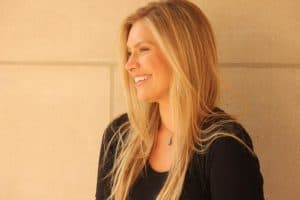The PEN Ten with Kelly Forsythe

The PEN Ten is PEN America’s weekly interview series. This week, Hafizah Geter, Content Editor and Publicity Coordinator at Poets House, speaks with Kelly Forsythe, poet and director of publicity for Copper Canyon Press. Her first book, Perennial, will be published in 2018 by Coffee House Press. In this interview, Geter and Forsythe discuss discovering poetry for the first time, the importance of reading student writing, and writing in bakeries.
When did being a writer begin to inform your sense of identity?
I remember being obsessed with writing as many short stories as quickly as possible when I was in elementary school, and the content was mainly about landscapes different from my own in Pittsburgh (farms, lakes, coastlines). Tuck Everlasting, The Giver, and Into the Land of the Unicorns were my literary inspirations — all of the stories I wrote were probably versions of those books.
In a formal sense, though, I first started thinking of myself as a writer during a class in high school with a great teacher named Mr. Antonio Caruso. The class was focused on contemporary poetry, and it was like someone switched a light on in a dark hallway with one thousand doors and opportunities. I loved the intensity of the process, loved competing with myself to find the “exact” right way of describing something, loved the transportation to and from reality.
Where is your favorite place to write?
In a bakery outside of the Washington, D.C. metro area, Praline. I finished writing my first book, Perennial (Coffee House Press, 2018), there, and also finished about a hundred buttercream cookies. It smells like hot chocolate year-round; it has a fake fireplace and pink walls surrounded in wood trim. This winter, I saw a woman bring her own full-size radiator inside Praline because it gets drafty. It’s that good of a spot: Even if it meant rolling an actual radiator through the door, this woman was not giving up her table or Praline’s coffee. Also, last summer, I visited Cooperstown, New York—this tiny town built around Otsego Lake—and wrote poem after poem inspired by the water and lakeside motels.
Obsessions are influences—what are yours?
Girlhood, sisterhood, summer camp, ghosts, feeling coldness amid humidity. Shipwrecks. Heist movies. Investigative reporting and sharp journalism that spans years and follows a long narrative arc (see this series by Nick Bilton, or this by Andrea Elliott). I am obsessed with the pursuit of tracking a moment in history through the lens of emotion.
What’s the most daring thing you’ve ever put into words?
The word “no,” in an email exchange last year.
What is the responsibility of the writer?
To write—and to read everything. In particular (but not limited to): the news, opinions that vary from your own, and student writing (not just at the institutional university-level, but after-school programs, weekend workshops, high schoolers, seniors). My students at the University of Maryland are responsible for asking questions during class, both of their own work and that of their classmates. To consistently ask yourself “why” or “how” goes beyond the classroom and doesn’t belong to it exclusively; it is a tenet of critical thinking and literary exploration. If literary citizenship is a thing, then it is partially motivated by relentless questioning.
While the notion of the public intellectual has fallen out of fashion, do you believe writers have a collective purpose?
Beyond the act of composition itself, I do not believe that writers have a collective purpose, if in this question “collective” means “the same.” There are threads of similarity, maybe: witnessing, seeking truth, questioning emotion, or accessing energy and channeling it toward a common goal. Writers do not have the same perspective or collective experience simply because they utilize the same medium of expression. And I think “purpose” is determined by one’s experience—mental, physical, metaphysical.
Recognizing years of cultural theft and appropriation, to whom would you like to give back the crown?
Jessie Redmon Fauset.
How has the very public mainstreaming of bigotry and more visible and documented police violence resonated in your personal life and writing?
More listening, more action, deeper understanding of the political power of language.
What book would you send to a government leader, domestic or foreign, who censors (or inhibits) marginalized and/or dissenting voices?
Citizen and Don’t Let Me Be Lonely by Claudia Rankine, Death in Spring by Mercè Rodoreda, The Art of Cruelty by Maggie Nelson.
Where is the line between observation and surveillance?
Purpose, (pre)-meditation, goals, and intent.






